|
|
|
|
|
|
|
|
|
|
 |
|
 |
| |
 |
| |
|
| |
| |
|
Area 1,001,450 sq km (391,191 sq miles).
Population 67,235,960.
Capital Cairo
Language Arabic.
Time GMT + 2
Electricity 220 volts / 50 Hz
|
|
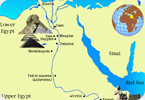 |
| |
|
|
We invite you to savor the delicious typical dishes of Egypt, such as: koshari (lentil and rice dish), maashi (stuffed vegetables) and ful medammes (broadbean stew).
When it comes to fruit, Egypt is a paradise of fragrant and tasty fruits. Don't forget to taste the guavas, dates, figs, and large variety of juicy mangos! .
Most hotels serve local dishes. The typical Egyptian foods are rice, pita bread (aysh) and fava beans.
Special dishes include roasted ground lamb like kebab, vegetable casserole, and stuffed, grilled pigeon.
Desserts like Ahwa and Baklava are local favorites.
Italian and French cuisine can be found in hotels and restaurants. Locally brewed beer and bottled sodas may be found throughout the country. Do not miss out on Egyptian coffee. It is well known delicious taste. |
|
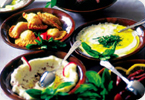 |
| |
|
|
Services & Government Offices:
Government offices, including post offices, are open from 8:00AM - 3:00PM, Saturday through Wednesday, and are closed Thursdays, Fridays and on national holidays.
Shops are open daily from 9:00AM - 1:00PM, and from 4:00PM - 8:00PM, with some shops closed on Sundays. |
|
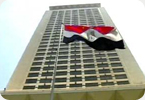 |
|
|
|
Vaccinations are no longer necessary or required to enter Egypt. However, we advise you to avoid drinking tap water, other unbottled beverages, and drinks with ice.
Please consult your physician for more advice.
For all health requirements and recommendations, travelers should check with a local department of health clinic or U.S Department of Health and Human Services Centers for Disease Control and Prevention (CDC). |
|
 |
|
|
|
The unit of currency is the Egyptian Pound (L.E.). It is divided into 100 Piasters (silver coins). Banknotes (paper currency) are available in the following denominations:
0.25, 0.50, 1, 5, 10, 20, 50, and 100 Pounds (L.E.). Coins are available in the following denominations: 5, 10, 20, and 25 Piasters. Exchange rate: 1 US Dollar = approximately 4.7 (L.E.), depending on the daily rate. Foreign currency can be exchanged at most banks and authorized exchange offices where the official rates of exchange are posted daily. |
|
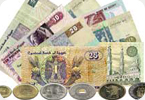 |
|
|
|
Credit cards like American express, Diners Club, MasterCard and Visa are accepted in most tourist establishments. |
|
 |
|
|
|
The importation and exportation of local currency is limited to 1000 Egyptian pounds for non-residents.
The importation of foreign currency is not limited and the exportation of foreign currency is permitted up to the amount imported and declared on arrival. |
|
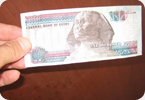 |
|
|
|
8:30am - 2pm Sunday to Thursday, closed Friday, Saturday and most public holidays. |
|
|
|
|
|
Ahlan wa sahlan ( Welcome )
Shokran ( Thank You )
Sabah el kher ( Good Morning )
Baksheesh ( Tip )
Ma`a el salama ( Good Bye )
Bokra ( Tomorrow )
Kolo Tamam ( All OK )
F'los ( Money )
Ana / Enta ( me / you )
Ana Baheb Masr ( I Love Egypt ) |
|
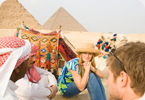 |
|
|
|
All visitors to Egypt must hold a current passport with at least 6 months validation.
Visas for a stay of one month may be obtained from all Egyptian Consulates or upon entry to Egypt. (for most nationalities). |
|
|
|
|
|
Land boundaries total 2,689 km, Gaza Strip 11 km, Israel 255 km, Libya 1,150 km, Sudan 1,273 km location Northern Africa, bordering the Mediterranean Sea, between Libya and the Giza Strip Coastline 2,450 km Terrain vast desert plateau interrupted by Nile valley and delta comparative area slightly more than three times the size of New Mexico Map. |
|
 |
|
|
|
Egyptian summers are hot and dry while the fall and winter seasons are moderate and the spring season windy. Some rain falls along the coast.
Light cottons and comfortable shoes are recommended for the hot summer months.
Hats, Sunglasses and sunscreen are recommended for protection against the harsh rays of the sun. Egypt is religious country; therefore, modest dress is essential. Short dresses should be avoided, particularly when visiting religious sites such as mosques. |
|
|
|
|
|
Shopping in bazaars is really fun. Traditional Egyptian accessories and gifts are easily available. Bargaining is common practice in all bazaars. Never offer a price that you are not willing to pay. Shopping hours are from 10 a.m. to 2 p.m. and from 4 p.m. to 9 p.m., extended during the summer. Khan El Khalili, Cairo’s famous bazaar, and some others have more flexible hours, but are closed on Sundays. Best shopping times are late morning and early evening. |
|
 |
|
|
|
The popular "baksheesh." Remember that in Egypt, you pay "baksheesh" for rendered services, and the amount is up to you. Your tour guide will be glad to help you determine appropriate tips when necessary. |
|
|
|
|
|
Air Domestic air travel is the fastest.
Public Transportation: There's a very good system of public and private transport in Egypt.
Buses and minibuses are cheaper and operate throughout the country. The 5000 km of rail connects just about every town in the country from Aswan to Alexandria. Taxis can be found easily in the main towns and cities. Decide the fare before the journey starts, many taxis traveling from town to town operate under a share system and wait until they are full before departure. |
|
 |
|
|
|
A comprehensible knowledge of Egyptian religion is indispensable for anyone who wishes to grasp the essence of the Egyptian civilization. Religion had deeply dominated all aspects of Egyptian culture---art, science, government, and law. In short, religion was the womb of Egypt's ancient culture. Egyptian religion can be characterized by its infinite complexity and diversity.
This diversity is justified by the constant growth of religious beliefs over the many centuries during which new ideas were introduced without ever discarding any old ones (except during the reign of Akhenaten). Therefore, to the ancient Egyptian this diversity of beliefs and gods was acceptable; because of which each divine power was approached through a variety of ../images related to nature, animal and human life.
Music is a very important part of Egyptian culture. Elements of western pop music are increasingly being integrated into contemporary Egyptian music and contemporary musicians are experimenting with newer styles. |
|
 |
|
|
|
The communication system in Egypt is large with adequate mobile network facilities available for international roamers. Now you also have the facility of being connected around the clock by using your own mobile phone or by renting a local handset thus being reachable has never been easier. For further cost cutting measures when calling home, several calling cards are available at the nearest sundry store.
Egypt country code is +20 and for mobiles +2012 OR +2010 |
|
 |
|
|
|
 |
|
 |
|
|
|
|
|
|